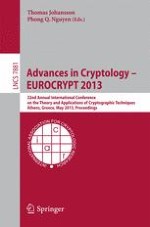2013 | OriginalPaper | Buchkapitel
Deterministic Public-Key Encryption for Adaptively Chosen Plaintext Distributions
verfasst von : Ananth Raghunathan, Gil Segev, Salil Vadhan
Erschienen in: Advances in Cryptology – EUROCRYPT 2013
Verlag: Springer Berlin Heidelberg
Aktivieren Sie unsere intelligente Suche, um passende Fachinhalte oder Patente zu finden.
Wählen Sie Textabschnitte aus um mit Künstlicher Intelligenz passenden Patente zu finden. powered by
Markieren Sie Textabschnitte, um KI-gestützt weitere passende Inhalte zu finden. powered by
Bellare, Boldyreva, and O’Neill (CRYPTO ’07) initiated the study of deterministic public-key encryption as an alternative in scenarios where randomized encryption has inherent drawbacks. The resulting line of research has so far guaranteed security only for adversarially-chosen plaintext distributions that are
independent
of the public key used by the scheme. In most scenarios, however, it is typically not realistic to assume that adversaries do not take the public key into account when attacking a scheme.
We show that it is possible to guarantee meaningful security even for plaintext distributions that depend on the public key. We extend the previously proposed notions of security, allowing adversaries to
adaptively
choose plaintext distributions
after
seeing the public key, in an
interactive
manner. The only restrictions we make are that: (1) plaintext distributions are unpredictable (as is essential in deterministic public-key encryption), and (2) the number of plaintext distributions from which each adversary is allowed to adaptively choose is upper bounded by 2
p
, where
p
can be any predetermined polynomial in the security parameter. For example, with
p
= 0 we capture plaintext distributions that are independent of the public key, and with
p
=
O
(
s
log
s
) we capture, in particular, all plaintext distributions that are samplable by circuits of size
s
.
Within our framework we present both constructions in the random-oracle model based on any public-key encryption scheme, and constructions in the standard model based on lossy trapdoor functions (thus, based on a variety of number-theoretic assumptions). Previously known constructions heavily relied on the independence between the plaintext distributions and the public key for the purposes of randomness extraction. In our setting, however, randomness extraction becomes significantly more challenging once the plaintext distributions and the public key are no longer independent. Our approach is inspired by research on randomness extraction from seed-dependent distributions. Underlying our approach is a new generalization of a method for such randomness extraction, originally introduced by Trevisan and Vadhan (FOCS ’00) and Dodis (PhD Thesis, MIT, ’00).
